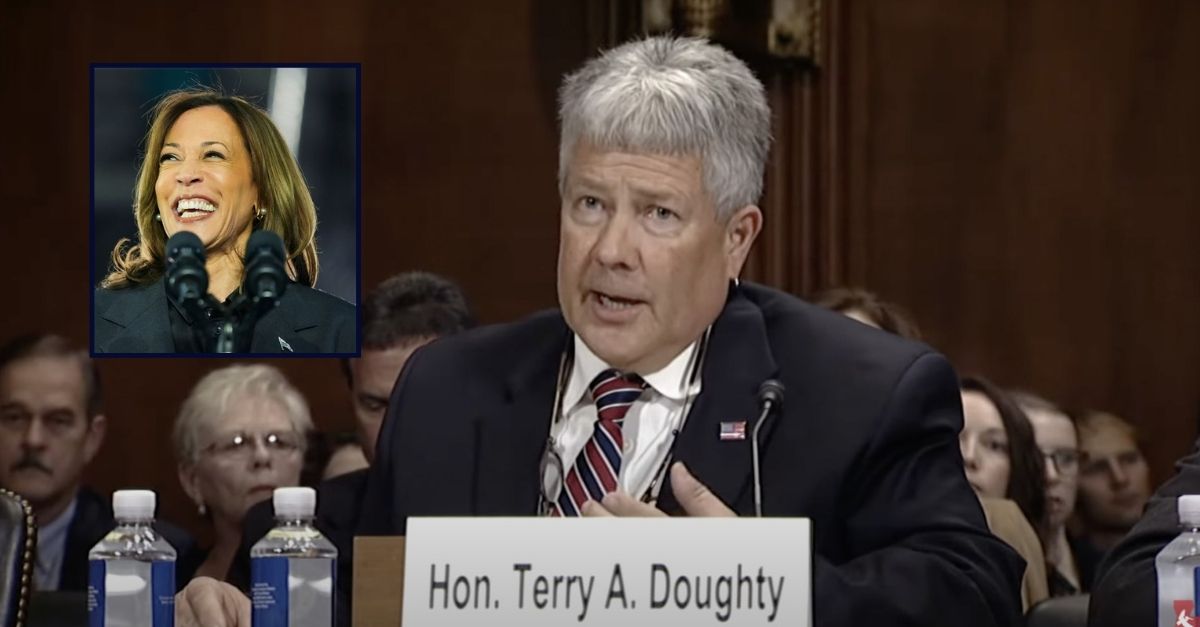
Inset: Democratic presidential nominee Vice President Kamala Harris speaks at a campaign rally at Little Chute High School, Friday, Nov. 1, 2024, in Little Chute, Wis. (AP Photo/Alex Brandon). Background: U.S. District Judge Terry A. Doughty (YouTube).
A federal judge appointed by Donald Trump appears to have mocked Vice President Kamala Harris on Friday in an order related to a long-running and controversial social media censorship case.
“We now consistently proceed — burdened by what has been,” U.S. District Judge Terry A. Doughty wrote in the order, an apparent reference to one of the failed presidential candidate’s trademark and oft-repeated stump speech lines: “unburdened by what has been.”
Later in the order, the court also muses about “regime change” and how Robert F. Kennedy might soon find himself in charge of a federal public health agency — calling that eventuality “relevant” and “wild.”
In the underlying case, Republican attorneys general in Louisiana and Missouri sued the Biden administration over a policy encouraging social media platforms to remove COVID-19-related misinformation — arguing that those requests violated the First Amendment.
On Independence Day in 2023, the district court issued a 155-page opinion and order that likened the Biden administration to an Orwellian “Ministry of Truth.” In an accompanying injunction, Doughty ordered federal officials and agencies to cease all contact with social media firms that could potentially interfere with free speech.
The administration appealed and lost — at first.
In September 2023, the conservative U.S. Court of Appeals for the Fifth Circuit agreed with Doughty that officials with the FBI, CDC, the White House, and the COVID-19 Response Team likely violated the First Amendment by “coercing and significantly encouraging” social media platforms to “censor disfavored” speech.
Days later, the Department of Justice went to the nation’s high court.
In the application for a stay pending appeal, Solicitor General Elizabeth Prelogar rubbished Doughty’s original order as “an unprecedented injunction installing the United States District Court for the Western District of Louisiana as the superintendent of the Executive Branch’s communications with and about social-media platforms.”
More Law&Crime coverage: Justice Alito really wanted to hear what RFK Jr. had to say in social media censorship case to ‘prevent the irreparable loss of his First Amendment rights’
Originally stylized as Missouri v. Biden, the case was later refashioned into Murthy v. Missouri — and then remanded back down to the district court level, a victory for the government. The majority opinion by Justice Amy Coney Barrett did not get to the merits of the controversy, however, and instead dismissed the case using the conservative standing doctrine — a judicial theory created by judges in the 1920s who sought to dampen the use and limits of constitutional redress by making it difficult for individuals to sue the government over perceived violations of their rights.
“The primary weakness in the record of past restrictions is the lack of specific causation findings with respect to any discrete instance of content moderation,” Barrett wrote. “The District Court made none. Nor did the Fifth Circuit.”
The opinion goes on:
The plaintiffs, without any concrete link between their injuries and the defendants’ conduct, ask us to conduct a review of the years-long communications between dozens of federal officials, across different agencies, with different social-media platforms, about different topics. This Court’s standing doctrine prevents us from “exercis[ing such] general legal oversight” of the other branches of Government. We therefore reverse the judgment of the Fifth Circuit and remand the case for further proceedings consistent with this opinion.
Now, on remand, Doughty is sticking to his guns.
“This case stems from Defendants’ violation of Plaintiffs’ First Amendment speech rights,” the order begins. “We held previously that Plaintiffs’ claims were likely meritorious and issued a preliminary injunction in their favor. The Fifth Circuit mostly agreed. But the Supreme Court did not.”
The heart of the order directs the parties to move forward with suggestions on how to accommodate “jurisdictional discovery.”
This, the court points out, is not merits-based discovery, but a way to suss out whether the claims can still be brought by finding a way to prove they do have standing. Doughty sums up the question facing the court as: “[W]hat is a district court to do when jurisdiction is neither certainly existent nor certainly non-existent?”
In real terms, the plaintiffs were given 14 days to come up with another bite at the apple, in terms of a standing argument; the defendants will then have 14 days to reply to those arguments.
Of course, the issues at stake in the litigation, the judge somewhat veeringly opines, might be rendered something not entirely unlike moot — though he does not use this exact legal term — in the near future.
“We end with the unignorable reality that regime change is imminent,” the order goes on. “However, to take dispositive action in this case based on regime change alone would be quintessentially speculative . . . speculation which is trebly prohibited by our standing requirements, our injunction requirements, and our discovery requirements. So we will not.”
Have a tip we should know? [email protected]

















































